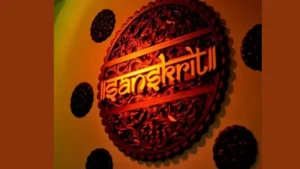Writer of Shrimad Bhagavad Gita
Maharishi Vedvyasa, also known as Krishna Dvaipayana Vyasa, holds a venerable status in various Hindu traditions and is credited as the author of the Shrimad Bhagavad Gita. Additionally, he is traditionally recognized as the sage behind the composition of the Mahabharata.
Vyasa is also regarded by many Hindus as a partial incarnation of the God Vishnu and the compiler of the mantras of the Vedas into four Vedas, as well as the author of the eighteen Puranas and the Brahma Sutras. He is one of the eight immortals Chiranjeevis.
Vyasa’s Life and Legacy
The name “Vyasa” means “arranger” or “compiler”, aptly reflecting his role in organizing the sacred Vedic hymns into distinct collections. Born to the sage Parashara and a fisherwoman named Satyavati, Vyasa’s life is captivating as his literacy contributions. His birth is shrouded in mystique, characterized by divine intervention and a sacred mission to preserve and disseminate the spiritual knowledge of the ages.
About Shrimad Bhagvad Gita
Shrimad Bhagvad Gita is a revered Hindu scripture found within the Mahabharata. It is a philosophical and spiritual discourse between Lord Krishna and the warrior prince Arjuna, set on the battlefield of Kurukshetra. It offers timeless guidance on ethical choices, self-realization and paths to spiritual growth, making it a profound source of wisdom and inspiration.
Key Highlights of Shrimad Bhagavad Gita
Some of the key points related to Shrimad Bhagvad Gita are as follows:
- The Bhagvad Gita is an ancient Hindu scripture that is part of the epic Mahabharata.
- It consists of a dialogue between Arjuna, a prince and warrior and Lord Krishna.
- The Gita addresses crucial moral and existential dilemmas that Arjuna faced on the battlefield.
- It delves into questions about the purpose of life and the nature of duty.
- One of the key teachings is about dharma or righteous duty and its importance in life.
- The Gita presents various paths to spiritual growth and self-realization.
- It highlights the significance of karma, which refers to actions and their consequences.
- The Gita consists of 700 verses in a poetic form with profound philosophical insights.
- Its wisdom is not confined to a particular time or culture; it offers universal guidance.
Find More General Studies News Here




 Which Country is known as the Land of Mo...
Which Country is known as the Land of Mo...
 Which Languages is known as the Mother o...
Which Languages is known as the Mother o...
 Which Country is known as the Highest Pr...
Which Country is known as the Highest Pr...








